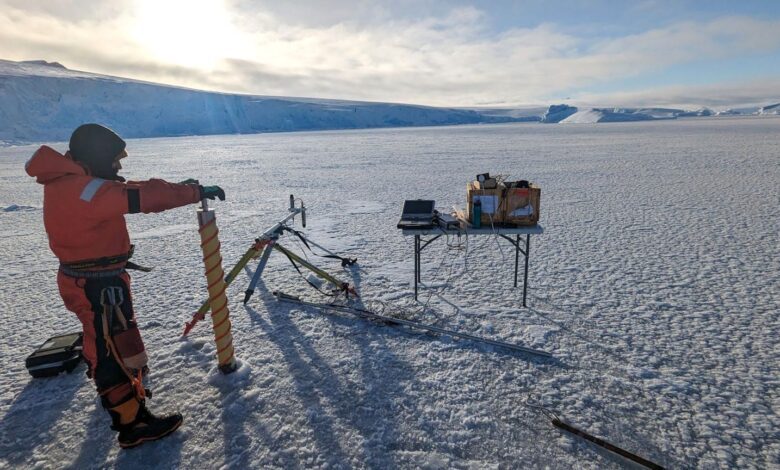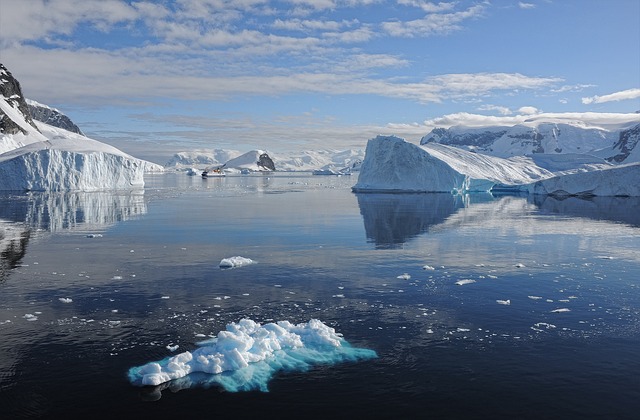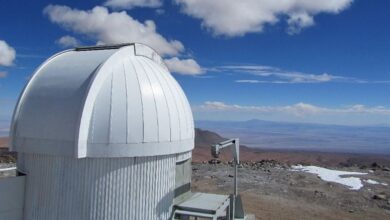Experts alarmed as Antarctic sea-ice reaches ‘mind-blowing’ low
According to scientists, Antarctica might become Earth's radiator if its ice stopped cooling the globe. Currently, there is fewer than 17 million square kilometers of floating ice in the Antarctic Ocean, which is 1.5 million square kilometers less than the norm for September and significantly less than prior winter record lows.

Satellite data reveals that the sea ice encircling Antarctica is well below any previously seen winter level, setting a troubling new standard for an area that previously appeared to be impervious to global warming.
Walter Meier, who monitors sea-ice for the National Snow and Ice Data Center, said it is “so far outside anything we’ve seen, it’s almost mind-blowing.” Polar specialists caution that an unstable Antarctica might have far-reaching effects. The vast area of ice that makes up Antarctica controls the planet’s temperature by cooling the ocean beneath and around it and reflecting solar energy back into the atmosphere.
According to scientists, Antarctica might become Earth’s radiator if its ice stopped cooling the globe. Currently, there is fewer than 17 million square kilometers of floating ice in the Antarctic Ocean, which is 1.5 million square kilometers less than the norm for September and significantly less than prior winter record lows.
About five times the size of the British Isles is that amount of missing ice. Dr. Meier is pessimistic about the sea ice’s prospects for major recovery. Though it has historically been difficult to examine patterns in Antarctica, scientists are still working to pinpoint all the causes of this year’s low sea ice.
Some experts contend that the low sea-ice level is the indicator to focus on in a year in which other records for the world’s heat and ocean temperatures have been broken.
“We can see how much more vulnerable it is,” says Dr Robbie Mallet, of the University of Manitoba, who is based on the Antarctic peninsula.
Already braving isolation, extreme cold and powerful winds, this year’s thin sea-ice has made his team’s work even more difficult. “There is a risk that it breaks off and drifts out to sea with us on it,” Dr Mallet says. Sea-ice is a component of an interrelated system that also includes icebergs, land ice, and enormous ice shelves, which are floating extensions of land ice that project out from the coast. Sea-ice forms in the continent’s winter (March to October) before completely melting in the summer.
The ice covering the land is shielded by sea ice, which also keeps the water from warming up.
The British Antarctic Survey’s Dr. Caroline Holmes adds that when the season changes to summer, when there is a chance for an uncontrollable feedback loop of ice melting, the effects of reducing sea-ice may become apparent.
As more sea ice melts, it reveals dark ocean regions that don’t reflect sunlight but instead absorb it, adding heat energy to the water and causing more ice to melt. The ice-albedo effect is what scientists refer to as.
That may significantly increase global warming and interfere with Antarctica’s regular function as a temperature control.
“Are we awakening this giant of Antarctica?” asks Prof Martin Siegert, a glaciologist at the University of Exeter. It would be “an absolute disaster for the world,” he says.
According to Prof. Anna Hogg, an Earth scientist at the University of Leeds, there are indications that what is now occurring to Antarctica’s ice sheets is in the worst-case scenario range of what was projected.
The disappearance of Antarctica’s land ice throughout the 1990s has caused the sea level to rise by 7.2mm. Even little sea level rises can cause extremely significant storm surges that might completely destroy coastal cities. The consequences would be devastating for millions of people worldwide if major volumes of land ice were to melt.
Antarctica has its own weather and climatic system since it is an isolated continent encircled by sea. Winter sea ice in Antarctica had been expanding up until 2016.
- Antarctic water currents are about to break down
- Ocean temperatures break records, with dire consequences for the world
But in March 2022, East Antarctica had an intense heatwave that caused temperatures to drop to -10C when they should have been closer to -50C.
According to Prof. Siegert, “We never imagined major weather events could happen there when I started researching the Antarctic 30 years ago. Sea ice has beaten summertime minimum records for three of the previous seven years, including February 2023.
Some scientists even think that these low ice records might be a sign of a fundamental change in the continent—a change in the factors that have kept the area isolated.
There is still a lot we don’t know about Antarctica because of its isolation and paucity of historical records. According to Dr. Robbie Mallet, the area is still considered to be the “Wild West” scientifically.
Scientists are aware of the extent of the sea ice but not, for example, the thickness. Solving that mystery might significantly alter regional climate models. Dr. Mallet is utilizing radar equipment at the research facility Rothera to measure the thickness of the sea ice as part of the global Defiant research project.

“There is a chance that it’s a really freak expression of natural variability,” he adds, implying that a variety of organic elements may have accumulated and be having an impact on the area at the same time.
According to experts, this year’s record-high ocean temperatures are probably an influence since warm water won’t freeze.
Additionally, modifications to the winds and ocean currents that affect Antarctic temperatures may have occurred. The El Niño weather phenomenon, currently developing in the Pacific, could also be subtly contributing to shrinking sea-ice, although it is still weak.
Dr Mallet says there are “very, very good reasons to be worried”. “It’s potentially a really alarming sign of Antarctic climate change that hasn’t been there for the last 40 years. And it’s only just emerging now.”
Please, also have a look into : Income Tax Department launches ‘young professional scheme’, opportunity for domain experts



